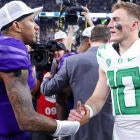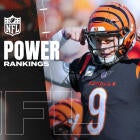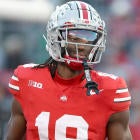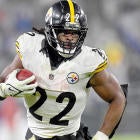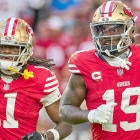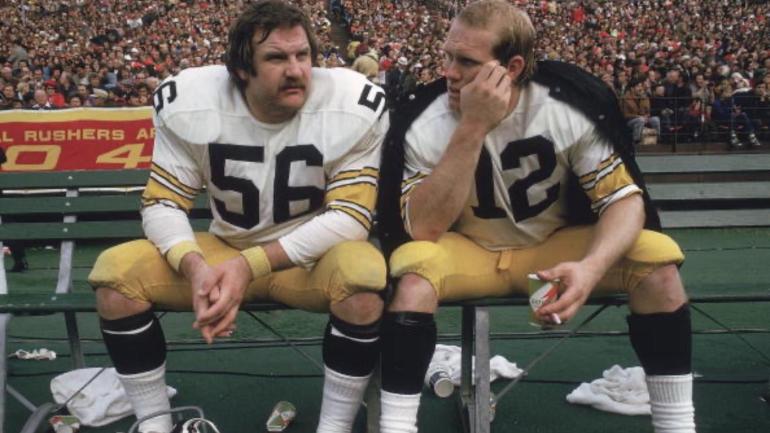
Ray Mansfield's family doesn't wonder what he would have thought about being part of the Pittsburgh Steelers' 2023 Hall of Honor induction class.
Mansfield, the first in the Steelers' rich linage of centers, was posthumously inducted this past weekend along with former teammate and fellow offensive lineman Gerry Mullins, defensive end Aaron Smith and linebacker James Harrison.
"Oh, he would have been absolutely thrilled," Mansfield's daughter, Kathleen Mansfield-Wolfley, said during a one-on-one interview with CBS Sports. "Completely honored."
Ray Mansfield’s family during the #Steelers’ recent 2023 Hall of Honor induction weekend. pic.twitter.com/1pzf4oT1Ce
— BryanDeArdo (@BryanDeArdo) November 4, 2023
Mansfield spent 13 of his 14 NFL seasons with Pittsburgh. He won two rings over that span and still holds the franchise record with 182 consecutive games played. Mansfield was one of just five Steelers players from Chuck Noll's first team who were still on the roster when the franchise won its first Super Bowl five years later.
"(Noll) always looked at my dad as a leader and expected that from him," Mansfield-Wolfley said. "He had tremendous respect for Chuck Noll."
A second-round pick of the Eagles in 1963, Mansfield started his career as a defensive tackle but made the switch to center in 1966, his third season with the Steelers, who at that time were one of the NFL's have-nots. Founded in 1933, the Steelers had yet to win a playoff game and usually lost more games than they won.
All of that changed with Art Rooney's son, Dan Rooney, began running the day-to-day operations in the late '60s. In 1969, he convinced his father to hire Noll, a then-37-year-old who had just lost Super Bowl III while serving as the Baltimore Colts' defensive coordinator.
Upon becoming head coach, Noll informed his new players that, while he intended to turn things around, many of them wouldn't be there when the turnaround happened. Of those players, Mansfield, then-rookie defensive tackle Joe Greene, linebacker Andy Russell, guard Sam Davis, and then-rookie quarterback Terry Hanratty, persevered and were part of the team's 1970s dynasty.
Mansfield played an integral role in the Steelers' rise. Along with his play, Mansfield was a team leader and beloved teammate. He was affectionately known as "Ranger" because of his love of the outdoors ("Old" was later added to the nickname).
"He was the building block of the Steelers' dynasty," said Mansfield's daughter, Caroline Mansfield-Wright. "He never didn't work hard. He was literally in every game. He loved his teammates."
Reporters also loved Mansfield, who could fill a notebook like few other athletes.
"I went from the depths of despair to the apex of ecstasy," he said following Pittsburgh's first-ever playoff win that was won courtesy of Franco Harris' "Immaculate Reception."
Mansfield had provided one of his classic lines as Harris' history-altering play was unfolding in real time. Mansfield, who witnessed the play from Pittsburgh's sideline, was standing next to a sideline worker who exclaimed that he couldn't believe what he just saw.
"Me neither," Mansfield said before adding, "Hey, we better get down to the end zone and get in the pictures."
Mansfield was already part of an iconic photo after he helped carry Noll off the field after Pittsburgh captured its first-ever division title six days before the "Immaculate Reception." He'd be in more pictures celebrating the team's first two Super Bowl titles.
As a team, the Steelers of that era produced a slew of Hall of Fame players. They also had arguably the greatest defense of all time, led by their "Steel Curtain" line consisting of Greene, L.C. Greenwood, Earl Holmes and Dwight White. But the offensive line also played an integral role in the success of the '70s Steelers. With Mansfield's and Mullins' inductions, each starting member of the Steelers' offensive line from the 1970s is now in the Hall of Honor.
"I think it says that they were a band of brothers," Mansfield-Wright said. "They're all together again."
Mullins, who was a member of each of the Steelers' four Super Bowl teams during the '70s, said that Mullins was instrumental to his success, especially as a young player.
"Ray was a grizzled veteran when I was a rookie and I heard stories about veterans didn't care too much for rookies because they thought you were out to get their jobs," Mullins said, via the Steelers' website. "When I came to Pittsburgh, Ray, Bruce Van Dyke, they were veterans and took me under their wing and helped me out. They showed me the ropes. They told me to excel on special teams. That was part of the learning process. Having guys like that give you a leg up was priceless."
The Steelers' offensive line had some banner performances during the decade. In Super Bowl IX, the line paved the way for Harris to run for a then-record 158 yards and a score in Pittsburgh's 16-6 win over Minnesota. The unit's finest hour, however, may have been two weeks earlier in Oakland in the AFC Championship Game. Mullins and Co. dominated the game and allowed the Steelers to rush for 210 yards and two scores on 51 attempts. Conversely, the Raiders ran for just 29 yards as Pittsburgh prevailed, 24-13.
"Definitely beating the Raiders," Mansfield-Wolfley said when asked to recall her dad's proudest moment as a Steeler. "I think that was his favorite. He talked a lot about it."
A team comprised of legends.
— Pittsburgh Steelers (@steelers) November 9, 2019
The 1974 #Steelers take #43 in the #NFL100 Greatest Teams countdown. pic.twitter.com/POLvSEwkAb
For Mansfield's family, the Hall of Honor induction weekend was a walk down memory lane. For Mansfield-Wolfley, it was a chance to reminisce about her childhood and the family atmosphere that was fostered by the team's then-owner and founder.
"For me, it was a lot of warm feelings of being back here," she said. "We grew up going to practices on Saturdays. We knew Art Rooney Sr. and he was a big part of our life.
"He made us kids a part of the family. He would bring us donuts while we watched cartoons in the conference room. Us girls would watch cartoons while the dads were getting ready to go out on the field.
"I even got to play "Planet of the Apes" with Art Rooney Sr. A lot of great memories."
Time marches on, but the success of those Steelers teams and the impact they had on pro football and the city of Pittsburgh continues to resonate. When talking about Mullins, part of his legacy is being the first of four standout centers that wore the black and gold. Mike Webster and Dermontti Dawson immediately followed Mansfield. Maurkice Pouncey picked up the torch in 2010 and put together a career that is worthy of future Hall of Fame consideration.
Mansfield's legacy as a player also includes his durability, leadership, and character that helped make the '70s Steelers a dynasty. His impact on those teams is now represented in the Hall of Honor, where Mansfield is once again among fellow teammates and coaches.
"He loved the whole Steelers family," Mansfield-Wolfley said. "The fans, the team, the owners, the organization.
"This was his home."














